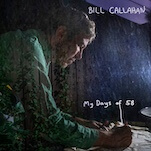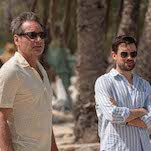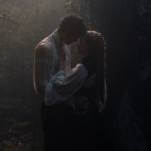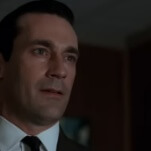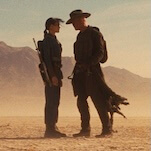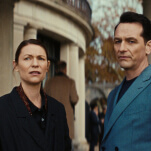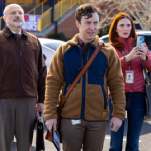O: Can you hear the whole show?
BH: Yes, we have a couple of shows from the recent past archived on our web site, and we hope to have more in the future. To hear a current show, what you have to do is find a site that belongs to a station that runs the show, and then access it at the time the show is running.
O: But your site doesn't list the stations.
BH: No, we can't do that, for arcane legal reasons. There is a site that does. Probably the best way to find one would be to enter "Dr. Demento" in a search engine. You'll turn up some information.
O: You listen to everything that's submitted to you. For every "Weird Al" Yankovic you've found, you must spend thousands of hours of your precious life listening to excruciating material.
BH: That is true. Actually, the really bad stuff I can usually identify pretty quickly, and sometimes that's fun. Sometimes the bad ones are really fun. The most excruciating ones are the ones that are in-between. They're good and they're kind of funny, there's something going on and there's some talent there, but it's just not quite making it. That's when I have to decide, "Is this something I should be playing?" I can't just look up in the music trades and see what other stations are playing, the way most program directors do. If they're on the edge about whether to play the new Goo Goo Dolls, they'll see who else is playing it, but I can't do that.
O: A lot of the stuff you hear on morning-zoo shows is horrible and unimaginative. You know, songs about Monica Lewinsky and stuff. How much of that do you endure?
BH: Oh, quite a bit. The Monica Lewinsky story inspired a whole lot of songs, and I played a good many of them until I came to the realization that none of them were attracting a lot of interest among my audience. So I just called a halt. This past weekend, in honor of the change in administration, I ran a retrospective of some of the Monica stuff.
O: Clinton certainly inspired a lot of novelty songs.
BH: All presidents do, some a lot more than others. Before Monica, the biggest topic we'd had in a while was Reagan's forgetfulness. And, of course, the JFK era—reaching back into history—was a golden age of comedy material.
O: As a rock historian, you're a pretty generous judge of music.
BH: I try and give everything its due.
O: But what do you hate?
BH: Boring music. I don't hate rap music, but I don't listen to it. I just don't devote any enormous amount of time to it, simply because I'm so busy hearing other things.
O: How do you find the time to listen to everything?
BH: I don't watch a whole lot of television. I listen in my car when I drive somewhere, and since I'm in Los Angeles, I spend a fair amount of time doing that. As soon as we finish, I'll be going to get the mail, which is actually a 45-minute drive because we moved. We want to keep the same post-office box, because people have known that box number for 20 years and we don't want to give it up. That gives me a chance to listen to a couple more new CDs.
O: Do you save everything that comes in?
BH: Pretty much.
O: How do you store it?
BH: It's getting to be a problem.
O: Do you ever throw anything away, or does your status as a historian prevent you from doing that?
BH: So far I haven't. Correspondence, yes, but I try and save letters that are interesting. Obviously, we don't save every order that we get for merchandise after a certain time.
O: Right. Obviously, you must have a warehouse or a basement that's a cavernous…
BH: I have accumulated… It's up to about a half-million records from my career over the years, and also tons of stuff that arrived new that wasn't necessarily for the show. Especially in the '70s and '80s, I was usually employed locally by a radio station that played what was then current music, which meant there'd be 15 or 20 LPs in my box every week.
O: People lose sight of the fact that you're not just a novelty-song guy.
BH: Right. In fact, I must mention that I have a book out, and it's not on novelty music at all. It's called Rhino's Cruise Through The Blues, and it's one of a series of guidebooks that Rhino is putting out. Mine is one of the first two, and it's a survey of blues from its origins, lost in the mists of time around 100 years ago to its current state and touching, of course, on all the greats, from Blind Lemon Jefferson to Jonny Lang, with Robert Johnson and Muddy Waters and B.B. King in between. B.B. wrote a nice foreword for it, and there are lots of pictures, so it's kind of an introduction to blues for the intelligent rock fan, or fan of anything else. I like to think it's got some provocative theories about how it all fits together. That's Rhino's Cruise Through The Blues by Barry Hansen, not Dr. Demento. Figuratively speaking, I take off my top hat for this one.
O: Getting back briefly to storage, don't you have a staff that helps you?
BH: No. I have hired people in the past on a temporary basis to help sort stuff and store it, but, no, it's just me.
O: It brings to mind this sort of Dr. Seussian vision of you running around in a top hat, carrying teetering stacks of reel-to-reel tape.
BH: That's not far from the truth. An ongoing project over the last couple of years has been… Reel-to-reel tapes are not holding up over time. Cassettes, actually, have lasted longer. But I've been transferring my old reel tapes to CD. Of course, we'll see how long the homemade CDs last, but so far, so good. Reel-to-reel tapes, oddly enough—the ones from the '50s and '60s—are not doing too badly. It's the '70s and early '80s that are the problem time. They switched to a different adhesive, the adhesive that holds it. Tape consists of plastic coated with iron oxide, and if the iron oxide starts coming off or if the adhesive starts oozing and becoming sticky, then you've got problems. The stickiness can be cured enough to at least play the tape once by baking it at a low temperature in an oven. If the oxide comes off, though, you might as well throw it away. Cassettes, I guess, were made with different adhesives, and they seem to play. They may have sounded lousy to start with, but they still sound equally lousy, and the better ones still sound fine, even ones I have that are 20 years old.
O: What's your view of Napster?
BH: It's just a more sophisticated version of trading tapes, like everybody used to do. I have no qualms about it. So far, it seems to be that it's not hurting the sale of CDs nearly as much as the record companies thought it would. The record companies thought that home taping was going to be the death of them, and that didn't turn out to be the case at all. People would tape an album and grow to love it and want the real thing. The same thing will happen in many cases with Napster. Certainly not in every case, but people who download the latest Radiohead album may love it enough so that if they can afford it, they'll want the real thing with the artwork. Heck, the real collectors are going to buy it on vinyl.
O: How much trouble do you have getting the show to the largest possible audience?
BH: Well, it's not always easy to clear it on radio stations. That's the technical term for getting a station to agree to carry a show; that's the way syndicates talk. It's not easy, because the fact that the show appeals to a large range of people and not just one narrow demographic is both a blessing and a curse. Many program directors absolutely love it, but others say, "Well, I'm running an active-rock station for males 18 to 30, and here you are playing something by Spike Jones. How can I justify that?" On the other hand, we're on a good many active-rock stations. It all comes down to how the program director feels.
O: It seems like 18- to 30-year-old males would be a pretty ideal demographic for you. Even if they haven't heard Spike Jones before, they'd probably like him.
BH: That's right, but it all depends. Some program directors understand that, and where the show is given a chance, given a decent time slot and left in that slot over a period of time, it does well for stations almost every time.
O: There aren't a lot of syndicated free-form radio shows.
BH: Well, there aren't any like mine. I'm not competing with some other guy who's just like me. On the other hand, there are a lot of syndicated shows out there. It is a competitive area. There are lots of weekend features they can draw from.
O: How long do you plan to do the show?
BH: As long as I can.
O: Have you ever launched the career of someone whose music you don't like?
BH: No, because I'm fairly easy to please, I'll put it that way. There are songs where maybe five or ten hearings was enough for me, but I don't mind. It's like a rock group that has a hit. If they have that hit, they'd better get used to playing it at every show, or have a good reason not to.
O: What do you think were the best albums of 2000? In any genre.
BH: Fancy that, because I'm just having to vote on the Grammys in the next day or two. It's a good question. I have to listen to a couple of them again. I tend not to think in terms of albums, because on my show I just think tracks. I hate to evade questions. Let me root for The Remains Of Tom Lehrer, because I'm up for a Grammy for my [liner] notes for that. The Richard Pryor box set is pretty essential for a stand-up-comedy fan. It's virtually, except for one, every important album he ever did. There was just one they couldn't get the rights to. As for recommendations outside of the reissues, there are a couple of new guys who are real good. One would be Stephen Lynch. His CD is called A Little Bit Special, and he's had a special on Comedy Central. He sings these very sick songs in this beautiful tenor voice and is quite amazing. He's kind of androgynous in a way. The other one is Eric "Red" Schwartz, who has an album that's a teeny bit more political, but also has some funny crowd-pleasers in it, like "Stoned People"—[singing] "These are things that stoned people do"—and one that imagines the Peanuts characters as grownups, called "Charliesomething." That's real fine. His album is called Pleading The First. Both of these are indie releases, and you can find each on the web by using their names: Eric Schwartz's site is ericschwartz.com and Stephen Lynch's is stephenlynch.com. If you're looking for me to plug something new, I'd love to plug those.
"Weird Al" Yankovic On Dr. Demento
If it hadn't been for the Good Doctor—that kindly purveyor of all things demented on the airwaves—I almost assuredly would have had to find a real job by now. As has been well-documented, Barry Hansen discovered me back in the mid-'70s when he decided to give some airtime to a gangly 16-year-old accordion-playing nerd who happened to send some unsolicited tapes to his nationally syndicated radio show. The Doctor and I have been close friends ever since, and I'm told that to this day I hold the enviable title of being his most-requested artist.
The Dr. Demento Show has been on the air for more than 30 years now. It is a bona fide American institution—a national treasure. In an era when pop music sometimes took itself a tad too seriously, Dr. D kept the art form of the novelty song alive by introducing a new generation to Stan Freberg, Tom Lehrer, Allan Sherman, Spike Jones, and a plethora of other warped geniuses. His show is an oasis of insanity in a desert of drab conformity. Thank God for Dr. D.
The Onion A.V. Club periodically seeks out the commentary of singer "Weird Al" Yankovic, whose newest album is titled Running With Scissors.




